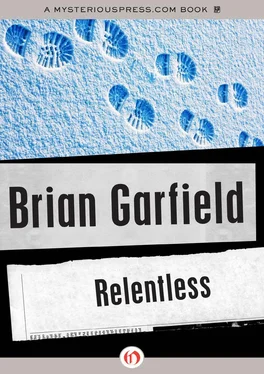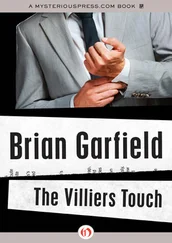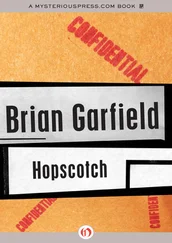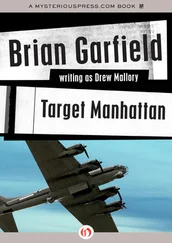Brian Garfield - Relentless
Здесь есть возможность читать онлайн «Brian Garfield - Relentless» весь текст электронной книги совершенно бесплатно (целиком полную версию без сокращений). В некоторых случаях можно слушать аудио, скачать через торрент в формате fb2 и присутствует краткое содержание. Жанр: Криминальный детектив, на английском языке. Описание произведения, (предисловие) а так же отзывы посетителей доступны на портале библиотеки ЛибКат.
- Название:Relentless
- Автор:
- Жанр:
- Год:неизвестен
- ISBN:нет данных
- Рейтинг книги:5 / 5. Голосов: 1
-
Избранное:Добавить в избранное
- Отзывы:
-
Ваша оценка:
- 100
- 1
- 2
- 3
- 4
- 5
Relentless: краткое содержание, описание и аннотация
Предлагаем к чтению аннотацию, описание, краткое содержание или предисловие (зависит от того, что написал сам автор книги «Relentless»). Если вы не нашли необходимую информацию о книге — напишите в комментариях, мы постараемся отыскать её.
Relentless — читать онлайн бесплатно полную книгу (весь текст) целиком
Ниже представлен текст книги, разбитый по страницам. Система сохранения места последней прочитанной страницы, позволяет с удобством читать онлайн бесплатно книгу «Relentless», без необходимости каждый раз заново искать на чём Вы остановились. Поставьте закладку, и сможете в любой момент перейти на страницу, на которой закончили чтение.
Интервал:
Закладка:
Walker went over to the plane with him. A mechanic working on a Cessna gave them an incurious glance and went back to work, standing on a ladder propped against the cowling.
It looked all right but appearances didn’t mean anything. You couldn’t tell much about an airplane by kicking the tires. “You got a key to it?”
Baraclough supplied one and Walker climbed inside, unlocked the glove box on the inside door panel and had a look at the logbooks: three of them-one for the airframe, one for each engine. The plane had quite a few hours on it since its last overhaul. One explosion per cylinder for every two rpm’s-after 460 hours, how many explosions? The plane had something like fifteen thousand parts. Walker shook his head. “I’d like to take her up and try her out.”
“Tomorrow. We’ll get your documentation fixed up and you can tell the tower you’re a Los Angeles pilot we hired. Now what about the other plane? What’ll we need?”
They discussed it and settled on a twin Beech. “If we can find one for rent.”
“If we can’t,” Baraclough said, “we’ll just have to steal one, won’t we.”
8
The Major and Baraclough obtained hand grenades and the Mace chemical spray cans from a Guard Armory near Sacramento. They drove over by way of Tahoe and pulled the Inspecting Officer bit. The National Guard sergeant on duty had been conditioned to demand identifications and passes from everyone who tried to get in but the Army had started earlier and spent longer conditioning him to salivate properly to the sound of a high-ranking officer’s voice, and Hargit’s bluff carried them through. He brought out three grenades and four cans of the chemical in a canvas AWOL bag and the sergeant gave him a smart salute as he left.
There was a suitable Beech for rent in Salt Lake and Burt drove Walker up there to pick it up. Walker was nervous around airports-there were bound to be people around who would recognize him-but he kept his head down and let Burt take care of the paperwork. They brought the Beech back and set it down on a meadow near the rented cabin. Burt went into town, rented a tank truck and brought aviation fuel out to the meadow to fill up the Beech’s tanks.
Wednesday afternoon-D-day minus two-Baraclough left Reno alone, driving the Lincoln. They were going to use it for their getaway car and abandon it afterward. Walker was surprised by that until Baraclough explained they had stolen it in the first place. They had cruised a rich El Paso residential neighborhood one evening until they’d found a house where there was a big party. People often left keys in their cars at parties because they didn’t want their carp to block the driveway. Hargit had picked out the big new Lincoln and they had driven it to Las Cruces, repainted it, and put a pair of Arizona plates on it that had come off a one hundred fifty dollar flivver Burt had bought in Willcox under a fake name. It seemed a lot of money to spend on a pair of plates but this way the license number wouldn’t be listed on any police blotter of stolen car numbers. They parked the flivver in a pay lot in Tucson and threw away the ticket.
Ultimately the cops would trace the Lincoln and find out that it belonged to some rich doctor in El Paso. It seemed to amuse Baraclough.
After Baraclough left Reno to drive to Arizona the rest of them had nothing to do but wait thirty-six hours. It wasn’t a good time for Walker. Up to now he hadn’t had much time for reflection. It had taken all his concentration to get the plan straight in his head and to account for the tedious details that were going to be his responsibility. He had his courses plotted on sectional air charts and it took a while to get the radio ranges worked out on Jeppesen charts; he had to figure fuel-consumption versus weight, possible wind directions and velocities, take-off and landing time schedules, and a low-altitude route that would keep them out of the Nellis radar picture and at the same time take them as far as possible from any highways and towns where people on the ground might notice the plane. There was no point giving the cops a chance to get a fix on their course.
But when all that was done and they had gone over the last verbal runthrough there was nothing left to think about but the risk of failure, and nothing left to do but think about it.
It had a complete unreality about it. You heard about such crimes, you read about them. You saw a dapper, good-humored, aging fellow being interviewed on a late TV talk show and you were enormously amused to realize that this engaging little old man was Willie Sutton, giving his classic answer to the interviewer’s straight-man question: But what made you decide to rob banks, Mr. Sutton? Well, Dick, y’know, it’s because that’s where the money is, see? And as audience to a trivial television entertainment you were amused by Willie Sutton’s quiet sparkling understatements about how he’d broken out of Sing Sing-he made it sound absurdly casual-how he’d disguised himself as a bank guard one time, a cop another, an armored-car guard yet another. But when you turned the set off and thought about it you saw that Willie Sutton didn’t have all that much to laugh about. He’d spent two-thirds of his life in prison.
It was depressing to think about. Walker wondered why he’d let them talk him into this. He went through Wednesday night and all day Thursday with a hard knot in his throat and a dry coppery taste on his tongue. On the face of it the whole caper was absurd. None of them knew anything about banks and the only one with any criminal experience was Hanratty-and Hanratty’s batting average was a lot worse than Willie Sutton’s. Hanratty had never tried anything above the level of petty crime before but just the same they’d nailed him three times running and he’d spent fifteen of the last twenty-three years of his miserable life behind bars. Here they were, a grounded pilot, three ex-soldiers, and a petty thief, hoping to bring off a million-dollar score without a ruffle. It just didn’t make sense. The percentages were wildly wrong.
Three things kept him from clearing out. One: Hargit, and Baraclough in his erratic way, appeared to know what they were doing. The plan seemed workable, the escape system was ingenious, and the Major had a self-confidence that was infectious. When he told you it was going to work you believed him, partly because of his personality and partly because you knew his record in the Army. Hargit knew guerrilla operations as well as any man alive. Two: if Walker tried to bug out now they’d probably kill him; they couldn’t let him walk around loose knowing what he knew about them. Nobody had uttered any threats but it was too obvious to ignore. The risk of quitting was at least as volatile as the risk of carrying it through.
And Three: There wasn’t anything else Walker wanted to do. He wanted the money-he had 10 percent of the take coming, and it looked now as if that would be closer to one hundred thousand dollars than to the fifty thousand that the Major had mentioned in the beginning. With that kind of money in the right South American country you could buy a lot of silence, you could buy all the licenses and certifications you wanted, you could pick up two or three serviceable airplanes and build the beginnings of a workable international airline. In a way he realized his ambitions weren’t all that much at odds with the Major’s. They each wanted the money not for itself but for the jobs it could buy for them.
In the end he knew it was the only chance he was going to have-one last grab at the brass ring before they shut down the merry-go-round. And so after all the panic and all the considerations of what might go wrong, he stayed with it.
9
Thursday night-H-hour minus eighteen-the Major gathered them together in the log-paneled front room for a precombat pep talk. Walker, who was scared but had made a kind of peace with himself, sat in one of the leather captain’s chairs and lifted his pack of cigarettes out of the bicep pocket of his leather flight jacket. His chin stung a little-a tiny nick from a nervous morning razor-and the tooth cavity was giving him trouble, but he felt surprisingly good: alert, anxious to start; confident and balanced like a halfback who, expecting to be rammed, intended to stay on his feet regardless.
Читать дальшеИнтервал:
Закладка:
Похожие книги на «Relentless»
Представляем Вашему вниманию похожие книги на «Relentless» списком для выбора. Мы отобрали схожую по названию и смыслу литературу в надежде предоставить читателям больше вариантов отыскать новые, интересные, ещё непрочитанные произведения.
Обсуждение, отзывы о книге «Relentless» и просто собственные мнения читателей. Оставьте ваши комментарии, напишите, что Вы думаете о произведении, его смысле или главных героях. Укажите что конкретно понравилось, а что нет, и почему Вы так считаете.











